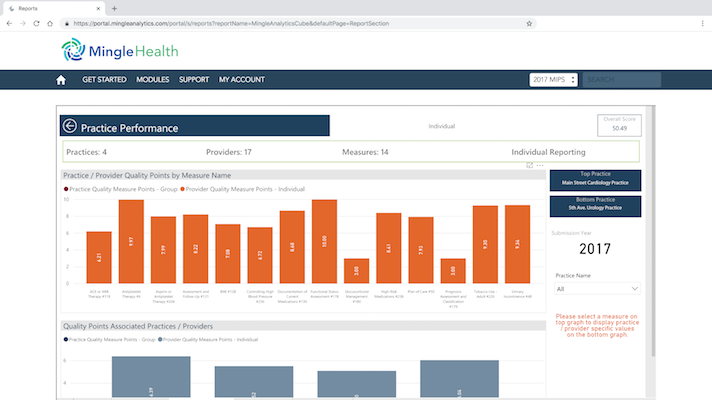
Care management software company SilverVue and software-enabled Medicare quality reporting consultancy Mingle Analytics have merged to form Mingle Health, a new company that will combine the strengths of the two firms.
SilverVue currently offers a suite of tools that deal with transitions of care, post-acute care, and practice performance. Both companies work with all kinds of providers, but provide unique value for private practitioners and smaller hospitals.
“As we’re out there trying to expand and work with the little guy, work with the physicians’ practices, there was nobody better than Mingle Analytics in helping them have that relationship with their clients,” SilverVue founder Will West, who will serve as CEO at Mingle Health, told MobiHealthNews. “Their net promoter scores were completely off the charts, they do outstanding work for every client of every size at a price that every client can afford. So we were immediately drawn to partnering with them, and that was the first thought. But what became increasingly clear was if we put these two product lines together we had an opportunity to do something truly special for physician practices, with a bundle and a platform that they haven’t seen before.”
Dan Mingle, founder and CEO of Mingle Analytics, who will serve as chairman of the new company, said the merger will allow customers to combine Mingle Analytics’ insights with actionable tools from SilverVue’s portfolio.
“For me, the reporting was just a foot in the door, but an important foot,” he said. “We look at the data, we determine how well you’re doing. And what SilverVue solution does is now gives us a tool to help improve that performance.”
Specifically, Mingle Health will focus on helping providers implement annual wellness visits, depression screenings, and other best practice services that are encouraged and reimbursed by CMS but often ignored by smaller practices that have trouble with the reporting requirements.
“By putting those in it helps the practice to improve revenue right away, as well as improve the scores, and then gives us better analytics and better reporting on the other side,” Mingle said. “And then we can keep just improving that cyclically as we progress year by year.”
Why it matters
Mingle Health hopes to address disparities in care that arise from the complicated nature of CMS reporting.
“Nobody wants to work with the little guy,” West said. “[That’s] what’s special about the combination of these two companies. For the first time ever, the little guy has access to a bundle of consulting and technology services that is akin to what a large healthcare system might have. … The large healthcare systems can hire a consultant and an army of people with technology to come in. But what does a physician practice do? They have the same regulatory problems.”
“Nobody’s better at understanding that environment than we are,” he continued. “And for less than 50 bucks a month they can hire us to be their consultants and make sure they’re in compliance and getting the reporting done. We then have a set of tools that can allow them to really perform on all that data, rather than it being a black hole that goes into the government and does nobody any good, but they can actually take that data and our advice around that data and actually improve patient care and improve business models at the practice level.”
In addition to improving revenue, the practices Mingle Health helps implement can also improve patient care, and even save lives. Recently a client’s depression screening protocol, suggested by SilverVue, caught a patient’s active suicide plan and allowed them to get help.
“Every doctor thinks they’re doing a great job. But it’s isolated to their practices; it doesn’t translate across the continuum,” Mingle, himself a former primary care physician, said. “…We’re too focused on the brushfire that’s burning now. A patient that comes in with a chief complaint, we’re great at identifying that chief complaint, but we’re not great at identifying the gaps in care that exist when that patient presents. We will use our solutions to systematize filling the gaps.”
What’s the trend
While Medicare and Medicaid continue to innovate to promote the use of technology as well as to encourage preventative health and value-based care, this can create difficulties for providers trying to keep up with the reporting requirements.
CMS seems aware of these concerns, having released an API in 2016 to help providers implement MACRA. Other companies, like CareCloud, have used a “MIPS guarantee” as a selling point for their provider-facing offering.
“The problem with MIPS and MACRA and PQRS is it’s always a moving target,” Dr. Carlos Sessin, founding partner of Vanguard Rheumatology of Miami Beach and a CareCloud client, told MobiHealthNews earlier this year. “Every year the target changes, the name changes, the acronym changes, and you have to stay up to date with what the requirements are. And once you understand what the requirements are, how do you capture that? How do you implement that? How do you record all that information and once you have all that information recorded how do you report that, and how much effort is it going to take?”
This is essentially the problem Mingle Health hopes to tackle, while also delivering improvements in care and revenue.

















